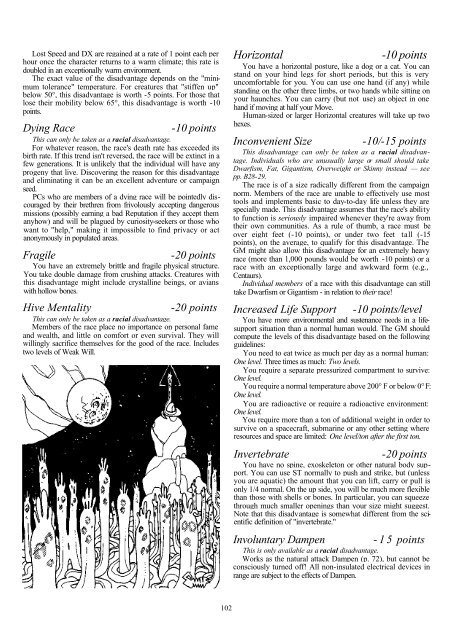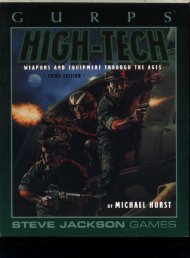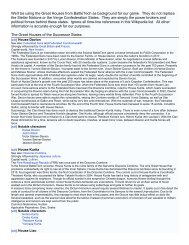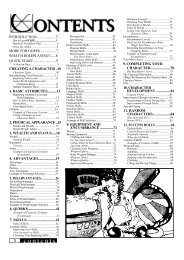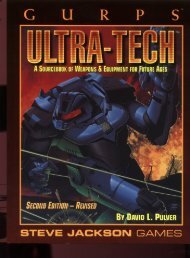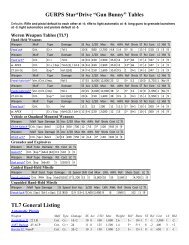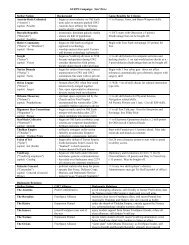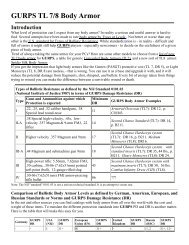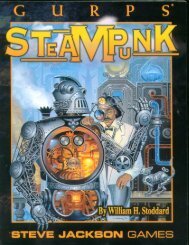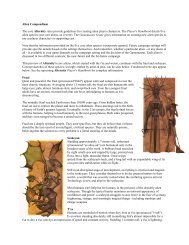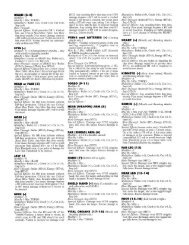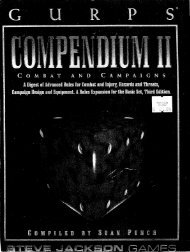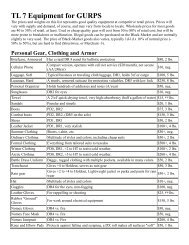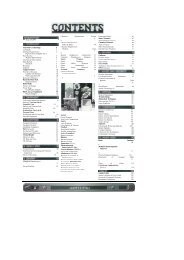GURPS - Compendium 1..
GURPS - Compendium 1..
GURPS - Compendium 1..
Create successful ePaper yourself
Turn your PDF publications into a flip-book with our unique Google optimized e-Paper software.
Lost Speed and DX are regained at a rate of 1 point each per<br />
hour once the character returns to a warm climate; this rate is<br />
doubled in an exceptionally warm environment.<br />
The exact value of the disadvantage depends on the "minimum<br />
tolerance" temperature. For creatures that "stiffen up"<br />
below 50°, this disadvantage is worth -5 points. For those that<br />
lose their mobility below 65°, this disadvantage is worth -10<br />
points.<br />
Dying Race<br />
-10 points<br />
This can only be taken as a racial disadvantage.<br />
For whatever reason, the race's death rate has exceeded its<br />
birth rate. If this trend isn't reversed, the race will be extinct in a<br />
few generations. It is unlikely that the individual will have any<br />
progeny that live. Discovering the reason for this disadvantage<br />
and eliminating it can be an excellent adventure or campaign<br />
seed.<br />
PCs who are members of a dying race will be pointedly discouraged<br />
by their brethren from frivolously accepting dangerous<br />
missions (possibly earning a bad Reputation if they accept them<br />
anyhow) and will be plagued by curiosity-seekers or those who<br />
want to "help," making it impossible to find privacy or act<br />
anonymously in populated areas.<br />
Fragile<br />
-20 points<br />
You have an extremely brittle and fragile physical structure.<br />
You take double damage from crushing attacks. Creatures with<br />
this disadvantage might include crystalline beings, or avians<br />
with hollow bones.<br />
Hive Mentality<br />
-20 points<br />
This can only be taken as a racial disadvantage.<br />
Members of the race place no importance on personal fame<br />
and wealth, and little on comfort or even survival. They will<br />
willingly sacrifice themselves for the good of the race. Includes<br />
two levels of Weak Will.<br />
Horizontal<br />
-10 points<br />
You have a horizontal posture, like a dog or a cat. You can<br />
stand on your hind legs for short periods, but this is very<br />
uncomfortable for you. You can use one hand (if any) while<br />
standing on the other three limbs, or two hands while sitting on<br />
your haunches. You can carry (but not use) an object in one<br />
hand if moving at half your Move.<br />
Human-sized or larger Horizontal creatures will take up two<br />
hexes.<br />
Inconvenient Size<br />
-10/-15 points<br />
This disadvantage can only be taken as a racial disadvantage.<br />
Individuals who are unusually large or small should take<br />
Dwarfism, Fat, Gigantism, Overweight or Skinny instead — see<br />
pp. B28-29.<br />
The race is of a size radically different from the campaign<br />
norm. Members of the race are unable to effectively use most<br />
tools and implements basic to day-to-day life unless they are<br />
specially made. This disadvantage assumes that the race's ability<br />
to function is seriously impaired whenever they're away from<br />
their own communities. As a rule of thumb, a race must be<br />
over eight feet (-10 points), or under two feet tall (-15<br />
points), on the average, to qualify for this disadvantage. The<br />
GM might also allow this disadvantage for an extremely heavy<br />
race (more than 1,000 pounds would be worth -10 points) or a<br />
race with an exceptionally large and awkward form (e.g.,<br />
Centaurs).<br />
Individual members of a race with this disadvantage can still<br />
take Dwarfism or Gigantism - in relation to their race!<br />
Increased Life Support<br />
-10 points/level<br />
You have more environmental and sustenance needs in a lifesupport<br />
situation than a normal human would. The GM should<br />
compute the levels of this disadvantage based on the following<br />
guidelines:<br />
You need to eat twice as much per day as a normal human:<br />
One level. Three times as much: Two levels.<br />
You require a separate pressurized compartment to survive:<br />
One level.<br />
You require a normal temperature above 200° F or below 0° F:<br />
One level.<br />
You are radioactive or require a radioactive environment:<br />
One level.<br />
You require more than a ton of additional weight in order to<br />
survive on a spacecraft, submarine or any other setting where<br />
resources and space are limited: One level/ton after the first ton.<br />
Invertebrate<br />
-20 points<br />
You have no spine, exoskeleton or other natural body support.<br />
You can use ST normally to push and strike, but (unless<br />
you are aquatic) the amount that you can lift, carry or pull is<br />
only 1/4 normal. On the up side, you will be much more flexible<br />
than those with shells or bones. In particular, you can squeeze<br />
through much smaller openings than your size might suggest.<br />
Note that this disadvantage is somewhat different from the scientific<br />
definition of "invertebrate."<br />
Involuntary Dampen<br />
- 15 points<br />
This is only available as a racial disadvantage.<br />
Works as the natural attack Dampen (p. 72), but cannot be<br />
consciously turned off! All non-insulated electrical devices in<br />
range are subject to the effects of Dampen.<br />
102


